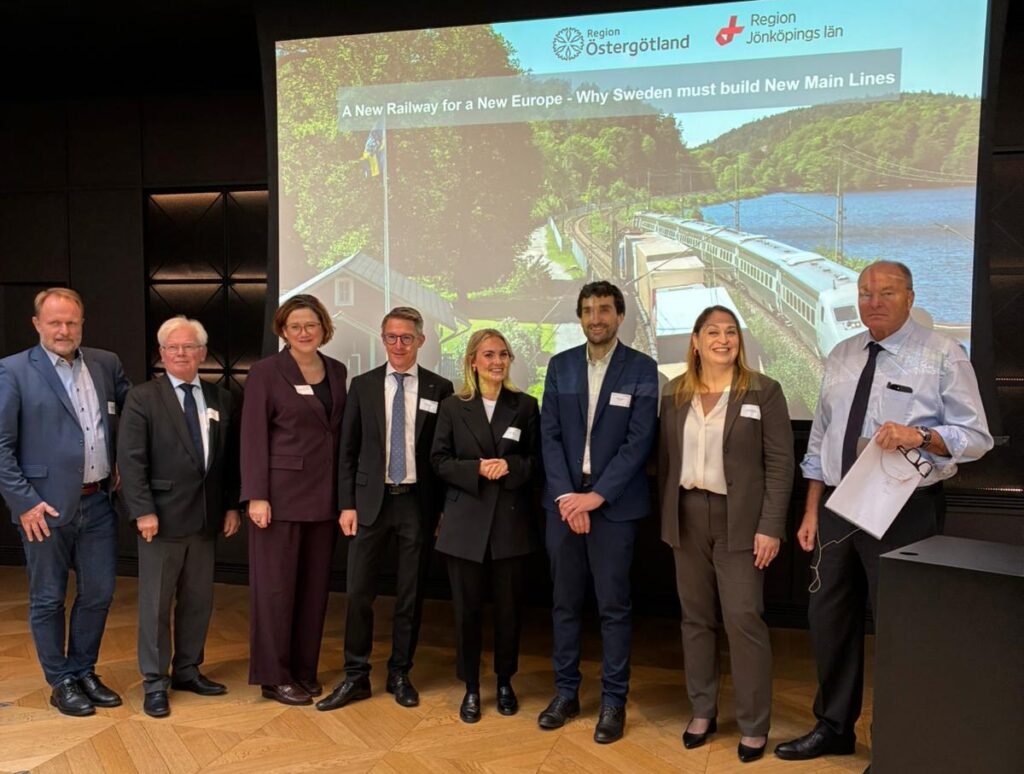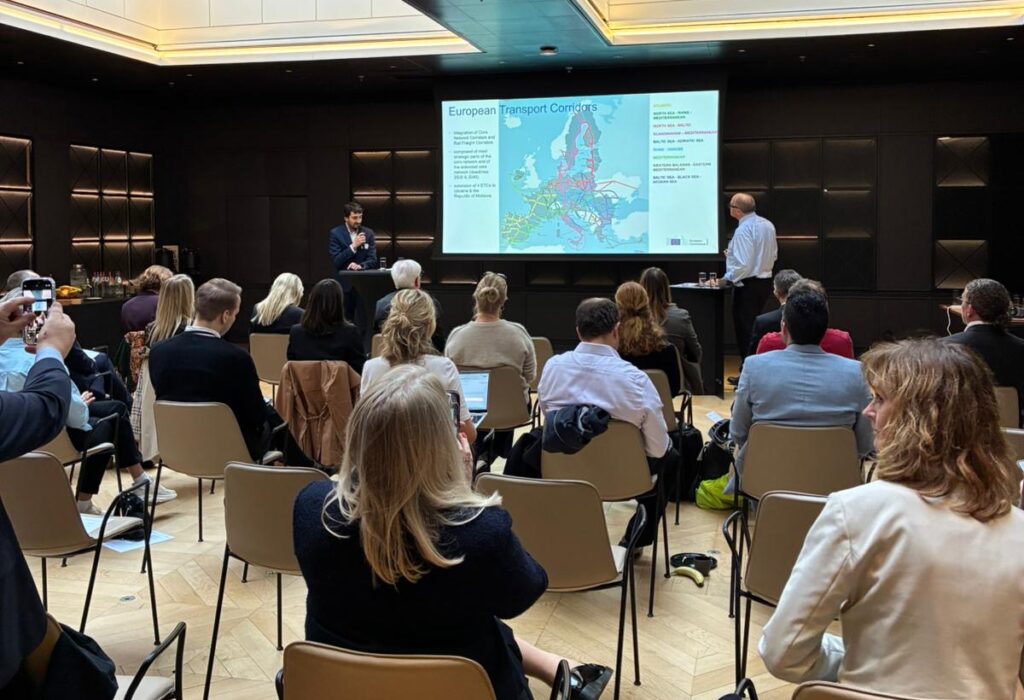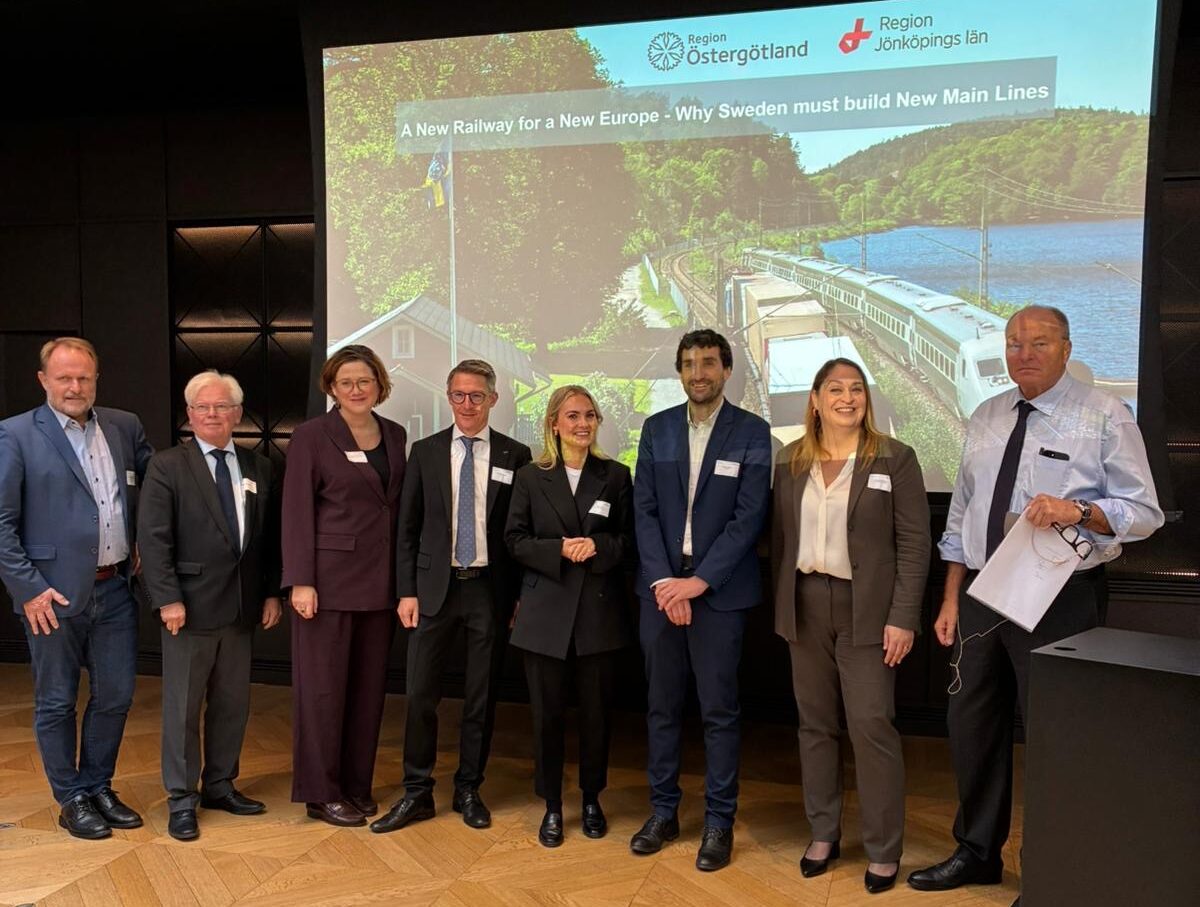Brussels event – New railway investments for a competitive Sweden in Europe
On 14th of October, Region Jönköping County and Region Östergötland jointly organised a roundtable discussion in Brussels to draw attention to and gather stakeholders around the need for new railway investments for a competitive Sweden in Europe. Major players were present from the business community, the EU institutions and Swedish authorities, among others. With a full venuel, engaged participants and an after-talk that continued throughout the day at adjacent transport events, these discussions have created a new momentum for the rail issue in southern Sweden. Read further for a summary of the highlights from the event.
Throughout Europe, train connections are expanding like never before. Noticeable for Northern Europe, not least, with the planned inauguration of the Fehmarn Belt link between Danish Rødby and German Puttgarden, in 2030. Further north, in Sweden, the Bothnian corridor from Haparanda down to Örebro is under construction, but in the south of the country, there is a missing link that inhibits the ambition to link Europe’s transport corridor. Sweden, and especially southern Sweden, is now at a crossroads where passivity in the expansion of rail in Sweden risks hampering business by creating bottlenecks and problems for surrounding transport routes when the rest of Europe finishes their upgrades connections with Sweden. Improved rail connectivity in the South of Sweden would not only result in more reliable routes for both passenger and freight, but it would also help facilitate the green transition, competitiveness and further economic integration in Europe. These were the main arguments laid out as a basis for discussion during the round table discussion that Region Jönköping County and Region Östergötland organised in Brussels on 14 October 2025. The message from the participants was clear. Sweden must not wait with building railway connections to Europe in the South of Sweden. Sweden cannot continue to see itself as an isolated island in the European periphery. Sweden is an integral and important part of Europe’s infrastructural bloodstream.

Summary of the event
The round table discussion that Region Jönköping County and Region Östergötland organised in Brussels on the 14th of October included several important stakeholders from the Commission, Sweden, Denmark, Germany and Italy. The discussion was moderated by Thomas Becker, CEO of STRING Megaregion and among the speakers from the host regions were Rachel De Basso, Chairwoman of the Regional Board of Region Jönköping County and Jan Owe-Larsson, Chairman of the Committee for Traffic and Urban Planning in Region Östergötland. In connection with the event, De Basso and Owe-Larsson, had written a debate article on the topic published in the Swedish News website focused on EU related matter, Europaportalen.
The event contained four main parts to guide participants through current challenges and needs, future prospects and concrete calls to Swedish decision-makers. Below are the main points on the agenda:
- Europe’s incomplete link
- Thomas Becker, moderator, CEO at String Megaregion
- Martin Zeitler, Lead Advisor to Pat Cox, European Commission Coordinator for the Scan-Med Corridor
- Stig Römer Winther, CEO of Fehmarn Belt Development
- Benefits for Swedish and European business
- Gustaf Engstrand, Head of Products and Alliances at Green Cargo
- Linda Thulin, Swedish Transport Administration and Chairman of the Board of the Scandinavian-Mediterranean Rail Freight Corridor
- Åsa Karlsson Björkmarker, Head of Public Affairs at IKEA Älmhult
- A Swedish crossroads
- Rachel De Basso (S), Chairman of the Regional Board of Region Jönköping County
- Jan Owe-Larsson (M), Chairman of the Traffic and Urban Planning Committee in Region Östergötland
- Ellen Dahl, Regional Manager Policy Southern Halland and Skåne Southern Sweden Chamber of Commerce
- A call for action
- All speakers
Stig Römer Winther, managing director at Fehrmarn Beld Development, asked himself why the Swedes were so passive and waiting to strengthen the south Swedish railway connection to Denmark and the Fehmarn-belt-tunnel. Römer Winter pointed out that the Swedes were one of the earliest to suggest an improved connection between Denmark and Germany. He went on to state that the Danes and Germans need the Swedes. The chairman of the regional board in Region Jönköping County, Rachel De Basso, agreed with Römer by stating that “Sweden cannot stand on the sidelines“. Sweden must be part of the European development of its rail connections.
Several members of the panel highlighted the importance of getting Swedish residents to trust the Swedish railway system, something they believe is not the case today. Among other things, Åsa Karlsson Björkmarker, from IKEA, pointed out that her employees who commute to Älmhult, cannot rely on the trains to run on time or arrive at all. Rachel De Basso agreed and continued the discussion along the same lines, highlighting that workers who commute to work have difficulty getting to work, which becomes a problem for both family life and business.
“Our employees cannot rely on the trains. They are not reliable. If we cannot get expertise to Älmhult, we will not have any products to transport from Älmhult” – Åsa Karlsson Björkmarker
At the end of the meeting, the moderator summarized the speakers’ main points
Without immediate action, Sweden risks becoming a bottleneck in the European transport corridor. The South Swedish main railway line is identified as an extra vulnerable segment of the European Scan-Med Corridor. Without expansion of capacity, the new Fehmarn-Belt link might create more problems than it solves. Two major players from the business community, Green Cargo and IKEA, emphasize that the current situation is unreliable and is a direct threat to Swedish competitiveness and growth. Regional voices from Region Jönköping County and Region Östergötland emphasize the need for a new national connectivity strategy with a focus on increased capacity and redundancy in the railway system. Speakers also called for long-term agreements that continue beyond electoral mandates and for a close dialogue between Sweden on the one side and the European Commission and neighbouring member states on the other. Without close cooperation, Sweden will fall behind and inhibit the economic potential that exists in the expansion of the European Scan-Med corridor.

Conclusions
To ensure Sweden’s future competitiveness, immediate measures are required. Planning and construction timelines are long in the context of infrastructure, and the bottlenecks that several speakers talked about will be a reality from the moment that the Danish and German projects are completed in the early 2030s. The question is how long Sweden will allow the infrastructure in the South of Sweden to be undersized compared to the European?
Below are some of the clearest messages that the participants addressed to the national level regarding railway investments in the South of Sweden during the coming years:
- Prioritize national objects that contribute to cross-border capacity linked to the Fehmarn Belt and Scan-Med and synchronize schedules with Denmark and Germany.
- Restore and plan the connection between Linköping-Jönköping-Borås and Jönköping – Hässleholm in the next revision of the TEN-T-regulation.
- Build for capacity and redundancy with more tracks where bottlenecks exist, such as on the Southern Main Line and on the West Coast Line
- Decide and build in whole packages, not in small parts. The pace must be increased to keep up with the opening of the Fehmarn-Belt link.
- Involve the business community and regions with concrete impact assessments, needs and benefit calculations. Rail connections are not a “nice to have”. This is crucial for regional and economic competitiveness and development in the whole of Sweden.
Do you want to hear more about the event, read articles about the event in different languages and get in touch with the organizers from Region Jönköping County and Region Östergötland? Please see the contact details and links below:
Per Hellqvist, Region Jönköpings län, per.hellqvist@rjl.se
Linus Johnson, Region Östergötland, linus.johnson@regionostergotland.se
Martin Broberg, SBHSS Brysselkontor, martin.broberg@sbhss.eu
Hugo Lindahl, Region Östergötlands EU-kontor, hugo.lindahl@regionostergotland.se
- Article Europaportalen – Dansk-tysk tunnel ger Sverige en historisk möjlighet – Europaportalen
- Article Femern – Femern-forbindelsens success haemmes af svag svensk jernbanestruktur
- Article Deutsche Verkehrs-Zeitung – Schwedische Wirtschaft drängt aug bahnausbau mach Schweden
- Article SBHSS – Behovet av nya järnvägssatsningar för ett konkurrenskraftigt Sverige i Europa
